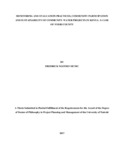Monitoring and Evaluation Practices, Community Participation and Sustainability of Community Water Projects in Kenya: a Case of Nyeri County
Abstract
Water sector has been undergoing various reforms in the past decade aimed at promoting projects sustainability. There is a general acceptance that (M&E) ie Monitoring and Evaluation practices has an influence on community project participation but its moderating influence on community participation and sustainability is not clear. This study sought to establish the moderating influence of M&E practices on community participation and sustainability of community water projects in Kenya, a case of Nyeri County. The study adopted a mixed method research anchored on a concurrent triangulation. The study was conducted in three sub counties of Nyeri County, Tetu, Mathira and Nyeri central which had a total of 10 water projects with 1052 beneficiaries. Respondents for this study comprised three strata. In the first strata were water project beneficiaries picked using Yamane formula (1967) and resulted into a sample size of 290 and later proportionately stratified across the ten water projects. Individual respondents of beneficiaries were identified using a systematic sampling procedure and subjected to self administered questionnaire. Out of 290 contacted respondents 207 positively responded to the survey questionnaire representing 71.38 percent successful return rate. The second strata comprised of 8 respondents who were included in focus group discussions of which 3 were committee members purposely selected while the rest 5 were ordinary project beneficiaries who were randomly selected. The third strata comprised of 10 water officers who were picked from the 10 water projects. Each of the 10 officers was subjected to a semi structured interview. Instrument validity was ensured with input from two supervisors from the University of Nairobi while reliability was determined using a split-half testing technique. Quantitative data was analyzed using linear regression model in SPSS software. The study established a significant independent influence at (p < 0.000) of community participation; in decision making, resource, mobilization, institutional collaboration and joint community participation on sustainability of projects at 5% level of significance. The study established that community participation in; decision making, resource mobilization and institution collaboration independently and jointly, influenced sustainability of community water projects at t ≥1.96 and p≤ 5% level of significance. The increasing strength of participation from weak, moderate to strong was positively correlated to the level of project sustainability. The study established that M&E Practices had a significant moderation effect on the relationship between community participation and sustainability of community water projects. However when the interaction between joint community participation and M&E practices are taken on board there is no significant effect between participation in institution collaboration and sustainability of water projects. The study concluded that community participation in decision making, resource mobilization and institution collaboration had significant independent and joint influence on sustainability of community water projects. Sustainability increased as their level increased. On the other hand M&E practices had a significant influence on the relationship between the community participation and sustainability of community water projects. To guarantee project sustainability the study recommends that community projects ensure project beneficiaries are involved in all the stages of the project, Project beneficiaries contribute both initial project capital as well as monthly fee for operation and maintence, projects to have supportive sector policies and regulations to attract support from a range of institutions, M&E practice is embedded in project management to aid in demonstrating accountability and ensure effectiveness. Future studies should; examine how institutional collaboration in water services has been affected by devolution of water services, the influence on performance of co–management of community projects, and consider how communities could harness appropriate technologies such rain-harvesting water technologies to build community water.
Publisher
University of Nairobi
Rights
Attribution-NonCommercial-NoDerivs 3.0 United StatesUsage Rights
http://creativecommons.org/licenses/by-nc-nd/3.0/us/Collections
The following license files are associated with this item:


